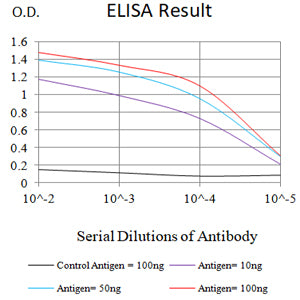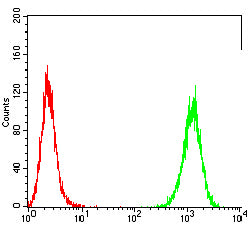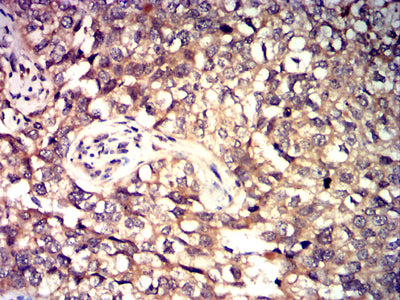


| WB | 咨询技术 | Human,Mouse,Rat |
| IF | 咨询技术 | Human,Mouse,Rat |
| IHC | 1/200-1/1000 | Human,Mouse,Rat |
| ICC | 技术咨询 | Human,Mouse,Rat |
| FCM | 1/200-1/400 | Human,Mouse,Rat |
| Elisa | 1/10000 | Human,Mouse,Rat |
| Aliases | TP63,AIS; KET; LMS; NBP; RHS; p40; p51; p63; EEC3; OFC8; p73H; p73L; SHFM4; TP53L; TP73L; p53CP; TP53CP; B(p51A); B(p51B) |
| Entrez GeneID | 8626 |
| clone | 2F3H6 |
| WB Predicted band size | 76.8kDa |
| Host/Isotype | Mouse IgG1 |
| Antibody Type | Primary antibody |
| Storage | Store at 4°C short term. Aliquot and store at -20°C long term. Avoid freeze/thaw cycles. |
| Species Reactivity | Human |
| Immunogen | Purified recombinant fragment of human TP63 (AA: 5-17) expressed in E. Coli. |
| Formulation | Purified antibody in PBS with 0.05% sodium azide |
+ +
以下是3篇关于TP63抗体的参考文献概览,信息基于公开研究内容整理:
---
1. **文献名称**:*p63 identifies keratinocyte stem cells*
**作者**:Pellegrini G, et al.
**摘要**:该研究通过特异性抗体识别TP63蛋白,发现其在表皮基底层干细胞中高表达,证实了TP63作为表皮干细胞标志物的作用,为组织再生研究提供关键依据。
2. **文献名称**:*TP63-mediated enhancer reprogramming drives the squamous subtype of pancreatic ductal adenocarcinoma*
**作者**:Maurer C, et al.
**摘要**:利用TP63抗体进行染色质免疫沉淀(ChIP-seq)及免疫组化分析,揭示TP63通过调控增强子活性促进胰腺导管腺癌鳞状亚型发展的分子机制。
3. **文献名称**:*ΔNp63α promotes terminal differentiation of osteoclast precursors and activates miR-34a/SATB2 feedback loop*
**作者**:Liu Y, et al.
**摘要**:研究采用TP63抗体(针对ΔN亚型)进行Western blot和免疫荧光实验,发现ΔNp63α通过调控miRNA通路影响破骨细胞分化,为骨代谢疾病提供潜在靶点。
---
**注**:实际引用时建议通过PubMed或期刊官网核对完整信息,部分研究可能需结合具体抗体克隆号(如4A4)筛选适用文献。
The TP63 antibody targets proteins encoded by the *TP63* gene, a member of the p53 tumor suppressor family. TP63 produces multiple isoforms through alternative splicing, primarily classified into two groups: TAp63 (transactivation-competent) and ΔNp63 (N-terminal truncated). These isoforms play distinct roles in epithelial development, cell differentiation, and oncogenesis. ΔNp63. the predominant isoform in stratified epithelia, acts as a survival factor and maintains stem cell populations, while TAp63 regulates apoptosis and senescence. TP63 is highly expressed in basal cells of epithelial tissues and is implicated in squamous cell carcinomas (SCCs), where ΔNp63 overexpression drives tumor progression.
Antibodies against TP63 are vital tools in research and diagnostics. They help identify cell origins in developmental studies, assess epithelial malignancies (e.g., lung, head/neck, and bladder cancers), and distinguish SCCs from other carcinomas. Commonly used clones like 4A4 detect all TP63 isoforms, while p40 (ΔNp63-specific) improves diagnostic specificity for SCCs. In immunohistochemistry, TP63 antibodies aid in classifying poorly differentiated tumors and evaluating metastatic origins. However, interpretation requires caution, as expression varies by tissue context and isoform functionality. Researchers also utilize these antibodies to explore TP63's role in stem cell regulation, tissue regeneration, and response to therapies. Their utility underscores TP63's dual role as both an oncogene and a guardian of epithelial integrity.
×